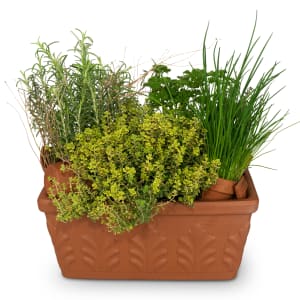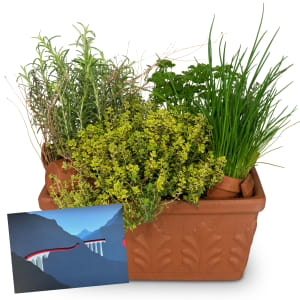Dill tastes spicy and tart, but at the same
time fresh and pleasantly sweet, with a slight anise flavor.
It goes well with fish, but also does well in salads
(especially cucumber), sauces, poultry, vegetables and curd cheese.
Depending on the
occasion, whole sprigs can be cooked and removed before serving.
Dill, tarragon & coriander
From tart or slightly peppery to oriental: passionate amateur
chefs also like to use
special herbs. Dill, tarragon and coriander are three of them.
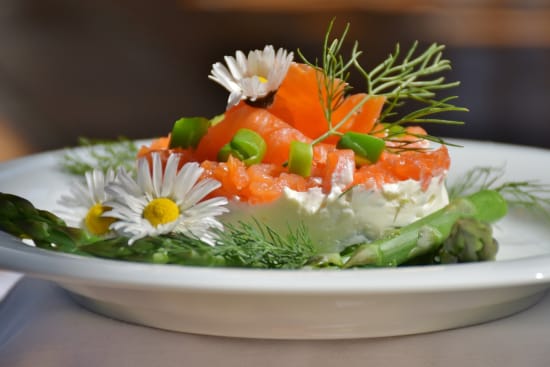
Dill - a charming companion

Dill is an annual plant that needs a sunny location
and nutrient-rich soil. Be sure to provide dill with adequate water.
This is because it has little drought resistance and is quite sensitive to irregular watering. If dill is cultivated on the balcony, it is recommended to add a layer of expanded clay to the pot.
This is because it has little drought resistance and is quite sensitive to irregular watering. If dill is cultivated on the balcony, it is recommended to add a layer of expanded clay to the pot.

Dill - also known as a medicinal plant
Dill is a well-known medicinal plant. In ancient times,
gladiators rubbed
themselves with dill oil because dill was considered to relieve pain.
In Egypt, it was used against headaches. In medieval herbalist books, dill was also considered to heal wounds. In addition, it was used to treat gastrointestinal disorders.
In Egypt, it was used against headaches. In medieval herbalist books, dill was also considered to heal wounds. In addition, it was used to treat gastrointestinal disorders.
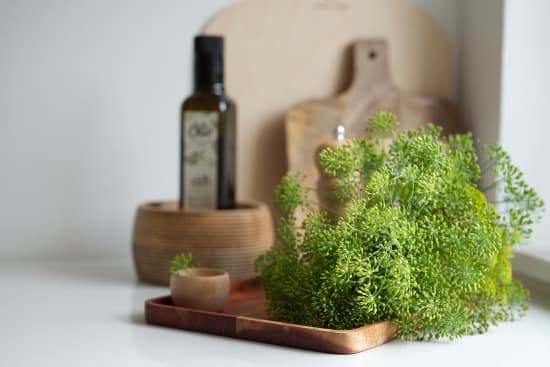
Today, dill is not often used in natural medicine.
However, it has been proven that dill stimulates the appetite, relieves cramps and aids digestion. In addition, dill is said to have a stimulating and invigorating effect.
However, it has been proven that dill stimulates the appetite, relieves cramps and aids digestion. In addition, dill is said to have a stimulating and invigorating effect.

Tarragon - refreshing taste
Tarragon is used often and with pleasure. The slightly peppery
herb with the fine citrus aroma goes well not only with fish,
white meat and poultry, but also with soups, salads, sauces,
dips, eggs, artichokes, asparagus and cauliflower.
Since it is very flavorful, it should be used sparingly.
Since it is very flavorful, it should be used sparingly.
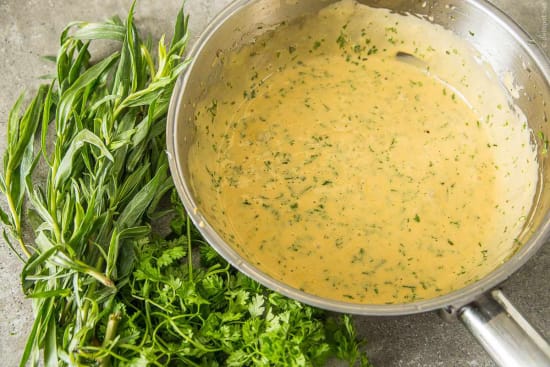
Plant perennial tarragon in a sunny spot sheltered from the wind.
It will tolerate partial shade as well, but expect weaker growth.
Da Estragon viel Platz benötigt, sollten Sie ihn auf dem Balkon in einem grossen Gefäss anpflanzen. Halten Sie den Estragon kontinuierlich feucht, aber giessen Sie nicht die Pflanze, sondern nur die Erde.
Tarragon requires a lot of space, so plant it on the balcony in a large container. Keep tarragon continuously moist, but do not water the plant, only the soil. By the way, tarragon varieties vary in aroma. The French one is said to be the most aromatic.
Da Estragon viel Platz benötigt, sollten Sie ihn auf dem Balkon in einem grossen Gefäss anpflanzen. Halten Sie den Estragon kontinuierlich feucht, aber giessen Sie nicht die Pflanze, sondern nur die Erde.
Tarragon requires a lot of space, so plant it on the balcony in a large container. Keep tarragon continuously moist, but do not water the plant, only the soil. By the way, tarragon varieties vary in aroma. The French one is said to be the most aromatic.

Tarragon - fragrance oil, magic plant and spice
The Chinese were probably the first to use tarragon as a spice.
Then the Egyptians discovered it as a fragrant oil, which they burned
in their temples. Finally, tarragon reached the ancient Greeks. They
called it «drakos» (snake, dragon) and used it for magic. Finally, the
Arabs took it into
culture. They called it «tarchun» and used it for seasoning food.
The term «estragon», as the spice is called in France, Germany and Switzerland, was formed in France after 1564. But the original Greek name «drakos» and the former Arabic name «tarchun» was not lost. For in Denmark the herb is still called «dragon», in Hungary «tárkony», in Turkey «tarhun» and in English «tarragon».
The term «estragon», as the spice is called in France, Germany and Switzerland, was formed in France after 1564. But the original Greek name «drakos» and the former Arabic name «tarchun» was not lost. For in Denmark the herb is still called «dragon», in Hungary «tárkony», in Turkey «tarhun» and in English «tarragon».
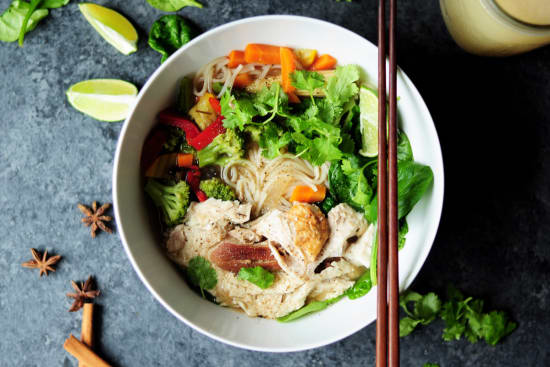
Coriander - the oriental parsley
It may not be to everyone's taste, but it is becoming more and
more common: fresh coriander. It tastes of sun and sea, of India,
Thailand, South America and the Canary Islands.
That's why it goes well with Asian dishes, poultry, fish and shrimp.
Fresh coriander herb is also the main ingredient of the cold sauce Mojo verde, which comes from the Canary Islands, and the Chilean herb sauce Pebre. Chopped coriander leaves in soup or salad add a fresh flavor to dishes.
Fresh coriander herb is also the main ingredient of the cold sauce Mojo verde, which comes from the Canary Islands, and the Chilean herb sauce Pebre. Chopped coriander leaves in soup or salad add a fresh flavor to dishes.

Plant annual cilantro in partial shade. Mix some sand into soil
that is as nutrient-rich as possible and provide good drainage.
Keep coriander rather dry and water only moderately if necessary.
Keep coriander rather dry and water only moderately if necessary.

Does coriander taste like lemon or soap?
Not everyone likes fresh coriander. According to a study, 97 percent
of people in Southeast Asia and the Middle East like it, while «only»
83 percent in
Europe do. But why is it perceived by many as soapy?
According to U.S. researchers, it's down to genetic makeup. This determines how we perceive tastes and smells - and whether we like coriander or perceive it as soapy.
According to U.S. researchers, it's down to genetic makeup. This determines how we perceive tastes and smells - and whether we like coriander or perceive it as soapy.
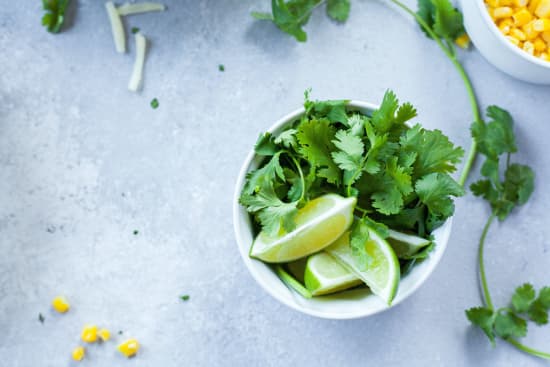
Some people's genes are sensitive to substances such as aldehyde,
which determines
the taste of coriander - and is also present in soaps.
There is an alternative: coriander seeds. Their spicy, slightly sweet aroma makes them a versatile spice. Seeds should be used unground: simply roast lightly and then crush in a mortar.
There is an alternative: coriander seeds. Their spicy, slightly sweet aroma makes them a versatile spice. Seeds should be used unground: simply roast lightly and then crush in a mortar.
Fresh herbs delivered directly to your home by mail –
conveniently ordered from FleuropHOME.
More exciting topics about herbs
Sage, Rosemary & Thyme
Sage, rosemary and thyme make us dream of the Mediterranean, of Italy and Provence. They intensely flavor and are very easy to care for.
Marjoram & Oregano
Marjoram and Oregano do belong to the same plant genus. But while marjoram can be combined with other spices, oregano is more commonly used alone.
Parsley & Chives
Parsley and chives shouldn't be planted next to each other because they don't get along. But in the kitchen, they are the most used allrounders.
Basil & Mint
Special and always a delight: basil and mint require a delicate touch. But used correctly, these herbs are really great.
Dill, tarragon & coriander
From tart or slightly peppery to oriental: passionate amateur chefs also like to use special herbs. Dill, tarragon and coriander are three of them.
Storing and preserving herbs
You don't always need fresh herbs. And sometimes you want to preserve them to have them on hand whenever you need them. Here are some tips.


